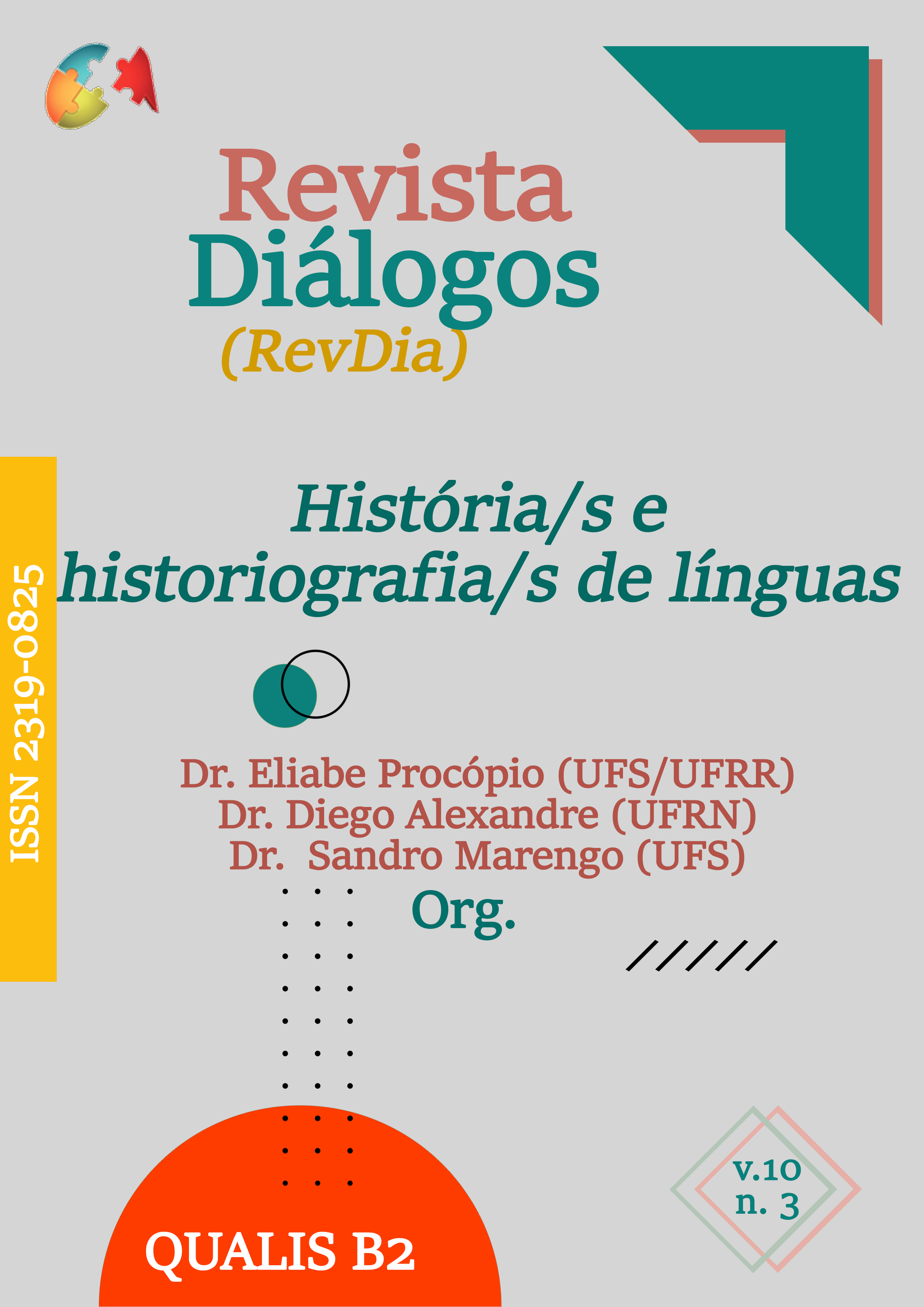Subject-Verb agreement in 19th century Brazilian Portuguese
an analysis in letters from Bahian Sertão
Keywords:
Brazilian Portuguese, Verbal agreement, Variation, Historical Sociolinguistics, “Sertões” of BahiaAbstract
This paper discusses the historical embeddedness of the variation of third person plural clause agreement in 19th century Brazilian Portuguese (BP), based on a corpus of 101 letters written by 16 senders and addressed to Cícero Dantas Martins, Baron of Jeremoabo, in the sertões of Bahia. For the discussion and analysis, the fac-simile and semi-diplomatic editions edited by Carneiro (2005) were used. Although the variation of third person plural clause agreement has been exhaustively studied in contemporary BP data, addressing this linguistic phenomenon from a historical perspective is still a challenge to the researcher, given the limitations imposed by the nature of the corpora that allow investigating previous phases of the language. The present work is based on the theoretical and methodological principles of Historical Sociolinguistics (ROMAINE, 1982; CONDE SILVESTRE, 2007; HERNANDEZ-CAMPOY; CONDE-SILVESTRE, 2012), in order to observe the linguistic and social variables that influence the presence/ absence of explicit plural marks in third-person verbal forms. Data point to the influence of the independent variables subject position in relation to the verb and phonetic salience in the application of the variable rule of third-person plural verbal agreement in the analysed corpus. Overall, the study opens ways for a better understanding and discussion of the historical process of verb agreement variation, the "touchstone" of Brazilian Portuguese, in the direction of making better use of "limited" and fragmentary data.
References
BAXTER, Alan. Concordância verbal. In: LOBO, Tânia; OLIVEIRA, Klebson (Org.). África à vista: dez estudos sobre o português escrito por africanos no Brasil do século XIX. Salvador: EDUFBA, 2009. p. 317-337.
BERGS, Alexander. The Uniformitarian Principle and the risk of anachronisms in language and social History. In: HERNÁNDEZ-CAMPOY, Juan Manuel; CONDE-SILVESTRE, Juan Camilo (Org.). The Handbook of Historical Sociolinguistics. Oxford: Wiley-Blackwell, 2012. p. 80-98.
BRITO, Rosana Carvalho; LACERDA, Mariana Fagundes de Oliveira; ARAÚJO, Silvana Silva de Farias. “Dirga au meus cumpadis qui não esqueça”: a concordância verbal com a terceira pessoa do plural em uma documentação epistolar do sertão baiano. In: BARROS, Isis Juliana Figueiredo de; SILVA, Jéssica Carneiro da; PARANHOS, Ramon Arend; ASSIS, Thamiris Santana Coelho (Org.). Português baiano: de Norte a Sul, de Leste a Oeste. Salvador: EDUFBA, 2022. p. 131-146.
CARNEIRO, Zenaide de O. Novais. Cartas brasileiras (1808-1904): um estudo linguístico-filológico. 2005. Tese (Doutorado em Linguística) – Instituto de Estudos da Linguagem, Universidade Estadual de Campinas, Campinas, SP, 2005.
CONDE SILVESTRE, Juan Camilo. Sociolingüística Histórica. Madrid: Editorial Gredos, 2007.
CONDE-SILVESTRE, Juan Camilo; HERNÁNDEZ-CAMPOY, Juan Manuel. Introduction. In: HERNÁNDEZ-CAMPOY, Juan Manuel; CONDE-SILVESTRE, Juan Camilo (Org.). The Handbook of Historical Sociolinguistics. Oxford: Wiley-Blackwell, 2012. p. 1-8.
GIMENO MENÉNDEZ, Francisco. Hacía una sociolingüística histórica. E.L.U.A – Estudios de Lingüística Universidad de Alicante, n. 1, p. 181-226, 1983. Disponível em: http://rua.ua. es/dspace/handle/10045/6678?mode=full. Acesso em: 2 jul. 2022.
HERNÁNDEZ-CAMPOY, Juan Manuel; SCHILLING, Natalie. The application of the quantitative paradigm to Historical Sociolinguistics: problems with the generalizability principle. In: HERNÁNDEZ-CAMPOY, Juan Manuel; CONDE-SILVESTRE, Juan Camilo (Org.). The Handbook of Historical Sociolinguistics. Oxford: Wiley-Blackwell, 2012. p. 63-79.
LABOV, William. Padrões sociolinguísticos. Tradução de Marcos Bagno, Maria Marta Pereira Scherre, Caroline Rodrigues Cardoso. São Paulo: Parábola, [1972] 2008.
LASS, Roger. Historical linguistics and language change. Cambridge: Cambridge University Press, 1997.
LEMLE, Mirian; NARO, Anthony Julius. Competências básicas do português. Rio de Janeiro: Fundação MOBRAL; Fundação Ford, 1977.
MATTOS E SILVA, Rosa Virgínia. Caminhos da Linguística Histórica: ouvir o inaudível. São Paulo: Parábola, 2008.
MATTOS E SILVA, Rosa Virgínia. Idéias para a história do português brasileiro: fragmentos para uma composição posterior. In: CASTILHO, Ataliba Teixeira de (Org.). Para a história do português brasileiro: vol. 1, primeiras idéias. São Paulo: Humanitas-FFLCH/USP; FAPESP, 1998. p. 21-52.
MEDINA MORALES, Francisca. Problemas metodológicos de la sociolingüística histórica, Forma y Función, Universidad Nacional de Colombia, Bogotá, n. 18, p. 115-137, 2005.
NEVALAINEN, Terttu; RAUMOLIN-BRUNBERG, Helena. Historical Sociolinguistics: origins, motivations, and paradigms. In: HERNÁNDEZ-CAMPOY, Juan Manuel; CONDE-SILVESTRE, Juan Camilo (Org.). The Handbook of Historical Sociolinguistics. Oxford: Wiley-Blackwell, 2012. p. 22-40.
ROMAINE, Suzanne. Socio-historical linguistics: its status and methodology. Cambridge: Cambridge University Press, 1982.
SOUZA, Pedro Daniel dos Santos. Concordância verbal em português: o que nos revela o período arcaico? 2005. Dissertação (Mestrado em Letras) – Instituto de Letras, Universidade Federal da Bahia, Salvador, 2005.
SOUZA, Pedro Daniel dos Santos. Português brasileiro, sintaxe e história: usos da concordância verbal no século XIX. Revista Philologus, Rio de Janeiro, CiFEFiL, ano 20, n° 58, p. 705-715, jan./abr. 2014.
Downloads
Published
How to Cite
Issue
Section
License

This work is licensed under a Creative Commons Attribution-NonCommercial-ShareAlike 4.0 International License.
Autores que publicam nesta revista concordam com os seguintes termos:
1) Autores mantém os direitos autorais e concedem à revista o direito de primeira publicação, com o trabalho simultaneamente licenciado sob a Licença Creative Commons Attribution que permite o compartilhamento do trabalho com reconhecimento da autoria e publicação inicial nesta revista.
2) Autores têm autorização para assumir contratos adicionais separadamente, para distribuição não-exclusiva da versão do trabalho publicada nesta revista (ex.: publicar em repositório institucional ou como capítulo de livro), com reconhecimento de autoria e publicação inicial nesta revista.
3) Autores têm permissão e são estimulados a publicar e distribuir seu trabalho online (ex.: em repositórios institucionais ou na sua página pessoal) a qualquer ponto antes ou durante o processo editorial, já que isso pode gerar alterações produtivas, bem como aumentar o impacto e a citação do trabalho publicado.





